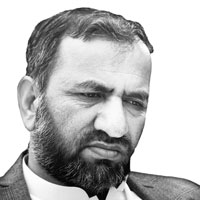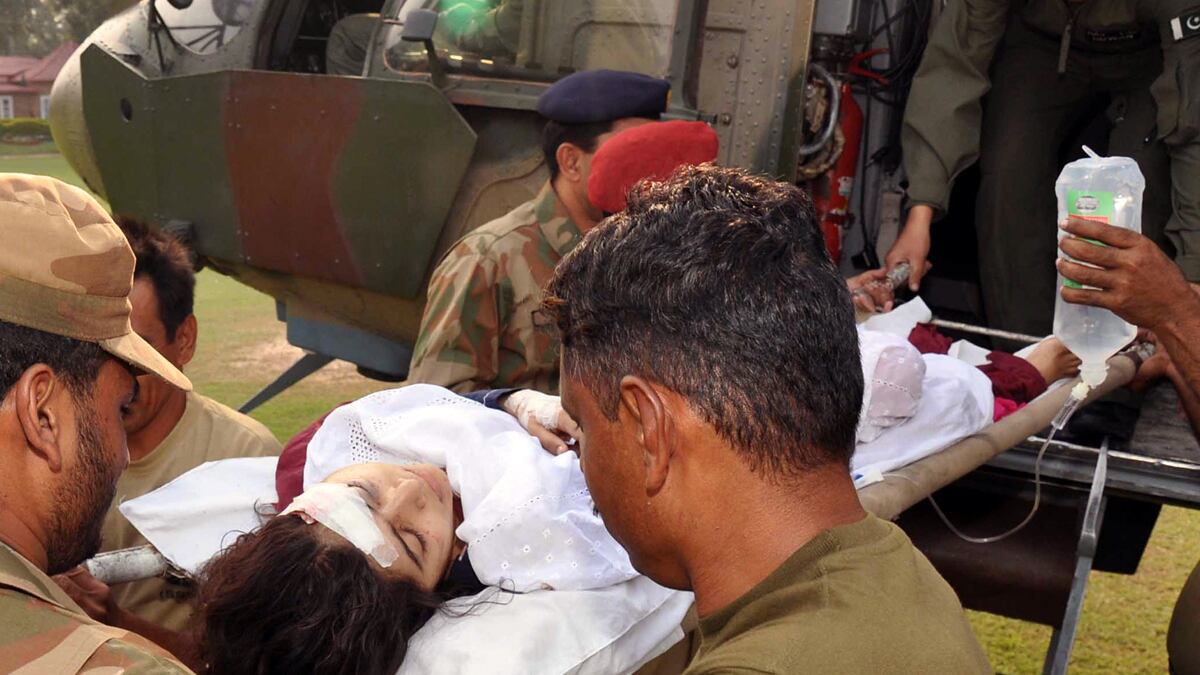A courageously outspoken 14-year-old is fighting for her life in Pakistan tonight. Malala Yousafzai was shot in the head and the neck by unidentified gunmen on her way home from school today in Mingora, the largest city in the Swat Valley. The Pakistani Taliban quickly claimed responsibility for the attack. Ihsanullah Ihsan, a spokesman for the militants’ umbrella group, the Tehrik-i-Taliban Pakistan (TTP), told reporters in Peshawar that she was targeted for her anti-Taliban views. Two of her schoolmates were also injured in the attack.

Yousafzai (a common tribal name among the Pashtun, both in Swat and in my native Afghanistan) was airlifted from Mingora to Peshawar’s Combined Military Hospital. Bashir Bilour, the chief minister of Khyber-Pakhtunkhwa province, spoke to reporters outside the hospital, denouncing the attacks as inhuman and un-Islamic. The girl’s condition seemed to be stable, he said, and she was responsive when doctors asked that she show her tongue and blink her eyes.
Nevertheless, he said, the next 10 days will be critical. After examining her thoroughly, the medical team informed the government that a bullet was lodged in her neck and was moving slowly toward her spinal cord. At this point swelling in her skull makes surgery impossible, the doctors say: the best chance of saving her life is to put her aboard an air ambulance and send her out of the country for expert treatment.
The girl first gained international attention in 2009, after militants led by the TTP warlord Maulana Fazlullah had taken control of the previously idyllic valley. The Islamists terrorized the inhabitants with floggings and public executions, closing and sometimes destroying music stores, theaters, and girls’ schools. Yousafzai responded by writing a diary for the BBC Urdu Service describing life under the TTP, using the pen name Gul Makai.
I first met her that same year at the Peshawar Press Club. She was a smiling, confident girl, well-mannered but by no means shy. She shook hands with the assembled journalists one by one while her burstingly proud father, Ziaudin Yousafzai, introduced us as friends. Her eyes gleamed. The Pakistani Army had finally expelled Fazlullah’s fighters. Meanwhile, Malala had helped prove to the world that the terrorists and fanatics did not speak for all Pakistanis. Her countrymen were as proud of her as her father was. Last year she was one of five nominees worldwide for the International Children’s Peace Prize.
Now the militants have tried to put an end to that. Malala’s schoolmate Aisha Yousufzai, 16, spoke with her just as the younger girl was heading for the van that was to take her home. Malala was smiling and called out: “Aisha let’s catch up this weekend and have fish at the restaurant by the river.” Those are the last words she heard from her friend, Aisha tells The Daily Beast. “She was my ideal, but after today I don’t want to be like Malala anymore, or my fate could be the same,” says Aisha. “The Taliban are still on the loose in Swat. Their attempt on Malala’s life will make all of us afraid to go to school tomorrow, and no woman will raise a voice against the extremists.
The shooting took place in broad daylight, only yards away from a military checkpoint in Mingora’s Sharif Abad neighborhood. Eyewitness accounts were confused and contradictory. According to one of the injured students, the van was stopped by some men (none of them seems sure how many), and one of the men asked the driver if they could look and see if any of their children were inside. The driver told him no, that was against the rules. “The man came near the van and asked, ‘Which one is Malala Yousufzai?’” the schoolmate says. “We pointed to her and told them, ‘This is Malala.’ Then they opened fire.”
The driver says he was flagged down by two motorcyclists who asked whether the van was from the Khushal Public School. The driver says he told them to ask the school and pulled away. Then he heard shots. The students shouted to him that Malala and another girl were bleeding, and he drove straight to the local hospital, where her father asked that she be taken to CMH Peshawar.

Political leaders and broadcasters have called on all Pakistanis to pray for Malala’s life. Retired cricket star Imran Khan, leader of the opposition Tehrik-i-Insaf party (PTI—Urdu for Pakistan Movement for Justice) offered to make all necessary arrangements to send the injured schoolgirl abroad for treatment, but his gesture has failed to mollify some of Malala’s friends and admirers. This past weekend, Khan led a mass demonstration demanding that America stop its drone attacks against armed militants in Pakistan’s tribal areas.
“I was a supporter of the PTI and Imran Khan,” one of the girl’s former teachers tells The Daily Beast. “Now I am challenging Imran Khan: your march against the drone attacks was wrong! Let the U.S. eliminate the Taliban! They are a burden to our civilization and all humanity! After this cowardly attack, I am a big supporter of drone attacks against those who don’t have a penny’s worth of human value. I love the U.S. drones! Come and hit them! They are human snacks!”
The teacher also has a stern message for the attackers. “Taliban: your mothers were women,” she says. “A woman gave birth to you and nursed you. If you had any sense of human decency you would not attack an innocent girl so proudly. Malala became a symbol and an ideal for girls in Swat. God, take my life instead of hers! The extremists are enemies of education and of women. The only solution is to eliminate them with U.S. drones.”
Ziaudin Yousafzai continues to express hope that his daughter will survive. “She feels well,” he says, clearly trying to reassure himself. “She will recover soon because the entire country is praying for her.” I remember how proud he was when she received the national peace award for her bravery and she was nominated for International Children’s Peace Prize. “I want to do something for the poor children who are being deprived of their basic rights,” Malala told me by phone at the time. “I want to be a politician. This country badly needs sincere leadership.” Her father took the receiver from her and asked me to be careful how she was quoted if the interview was published. He was afraid of how the Taliban might respond to what she said about them. The interview stayed in my notebook.
Not long ago she was interviewed on Pakistan’s Geo TV show Capital Talk, and she singled out Barack Obama for special praise. The anchor, Hamid Mir, clearly sensed the gravity of what she was saying. He addressed his viewers directly, reminding them that she was only a child, and that it would be wrong to harm her for expressing anti-Taliban views.
Boasting to reporters that the Pakistani Taliban had been behind the attack, Ihsan reminded them of the girl’s television appearance. “Malala has called the American President Barack Obama her ideal,” the TTP spokesman said, as if that could possibly justify the deliberate shooting of an unarmed girl. Millions of Pakistanis know he’s wrong.






